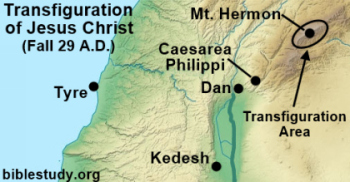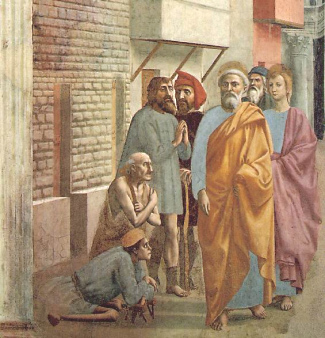[Where Were Bible Books Written?]
The name of Peter is found 162 times in 156 King James New Testament verses. The name of Paul, however, is recorded 163 times in 159 verses.
Peter's writing of 2Peter is one of eight Biblical books whose names begin with the number 2. The other seven are 2Samuel, 2Kings, 2Chronicles, 2Corinthians, 2Thessalonians, 2Timothy and finally 2John.
Peter is the only one of Jesus' apostles who both saw his transfiguration (Matthew 17:3 - 9, Mark 9:5 - 10, Luke 9:31 - 36) and wrote about it (2Peter 1:16 - 18).
Greeting from God
The first epistle of Peter, like the other General Epistles of James, 1John and 3John, does not open with a greeting from the Godhead (God the Father and Jesus). Peter's second epistle, however, does open with such a greeting.
Grace and peace be multiplied unto you through the knowledge of God, and of Jesus our Lord . . . (2Peter 1:2, KJV).
How Old Was He?
Wikipedia's article on St. Peter states he was possibly born around 1 B.C. If this is true, then 2Peter was written when the apostle was roughly between the ages of 65 and 66 years old.
Precious Promises
The second epistle of Peter reveals a couple of precious promises from God. The first summaries that all promises ultimately lead to the greatest one being fulfilled which is partaking of the same divine nature the Lord has! The second promises that immortalized believers will one day exist in a perfect universe without sin.
Whereby are given unto us exceeding great and precious promises: that by these ye might be partakers of the divine nature . . .
Nevertheless we, according to his promise, look for new heavens and a new earth, wherein dwelleth righteousness (2Peter 1:4, 3:13).
Recognizing Deity
Peter is the only apostle who bore witness to Jesus' deity during the Lord's lifetime. He did this not only once but twice, with both occurrences taking place within the same year. The first profession took place between April and Mid-September in 29 A.D.
[Was Jesus the God
of the Old Testament?]
Then said Jesus unto the twelve, Will ye also go away? Then Simon Peter answered him, Lord, to whom shall we go? thou hast the words of eternal life. And we believe and are sure that thou art that Christ, the Son of the living God (John 6:67 - 69).
The second declaration by Peter of Jesus' deity took place just prior to the Transfiguration in late September of 29 A.D.

He saith unto them, But whom say ye that I am? And Simon Peter answered and said, Thou art the Christ, the Son of the living God (Matthew 16:15 - 16).
Glory and Death
Only Peter, James and John, of the twelve apostles, saw Jesus' glory during the Transfiguration (Matthew 17:1 - 9, Mark 9:1 - 9, Luke 9:28 - 36). James was the first of the three to die (and the first martyr of any of the twelve apostles) when he perished fifteen years later at the hands of Herod Agrippa I in 44 A.D. (Acts 12:1 - 2).
Peter was the second of the three disciples to perish when he died a martyr likely in 68 A.D. The Apostle John, the longest lived of any of the original apostles, died around 100 A.D.
Back from the Dead
Jesus, during his ministry, raised three people from the dead (Luke 7:11 - 18, 8:49 - 52, John 11). Peter is the only one of the twelve apostles, after Jesus' resurrection, who is Biblically documented as raising the dead (Acts 9:36 - 40). The only other New Testament individual who brought someone back to life was the Apostle Paul (20:9 - 12).
[What is the Baptism of the Dead?]
Impulsive Peter
Peter is the only one of the original twelve disciples where the Bible records him disagreeing with Jesus during his ministry. He, in fact, openly clashed with the Lord on several occasions!
Peter's first disagreement with Jesus concerned his upcoming suffering and death at the hands of religious leaders in Jerusalem (Matthew 16:21 - 23).
The apostle's second disagreement initially opposed Jesus washing his feet during the last Passover (John 13:3 - 8).

The last conflict took place as the Lord, along with Peter and the other disciples, were walking to the Mount of Olives after the final Passover. Peter twice zealously asserted that, although the Lord said all the disciples would abandon him, he would not!
And Jesus saith unto them, All ye shall be offended because of me this night . . . But Peter said unto him, Although all shall be offended, yet will not I.
And Jesus saith unto him, Verily I say unto thee, That this day, even in this night, before the cock crow twice, thou shalt deny me thrice. But he (Peter) spake the more vehemently, If I should die with thee, I will not deny thee in any wise . . . (Mark 14:27, 29 - 31).
Apostolic Referrals
Peter mentions Paul by name once (2Peter 3:15) in the King James Bible. Paul, however, refers to him ten times! He is called Cephas four times in 1Corinthians (1Corinthians 1:12, 3:22, 9:5, 15:5). In Galatians 1 he is called Peter once (Galatians 1:18) while in chapter 2 he uses the name Peter four times and Cephas once in the same chapter!
Robbing Peter
The phrase "robbing Peter to pay Paul" refers to taking or borrowing from one source to repay a debt owed to another. This leaves the debtor in no better financial shape than before the exchange. There is some disagreement, however, as to the origin of the phrase.
[What Does Bible Say About Debt?]
One explanation is that the phrase is associated with England's abbey church of St. Peter in Westminster. It was created a cathedral in 1550 A.D. but lost its status ten years later. Many of its estates, after losing this status and rejoining the diocese of London, were appropriated (sold?) to pay for St. Paul's Cathedral repairs (Everyday Phrases - Their Origins and Meanings, pgs. 120 - 21).
The phrase, however, is likely older than the above explanation. The site Phrase Finder states that "robbing Peter to pay Paul" goes back at least to 1380 A.D. (The Free Dictionary says its 1340). It was apparently used by John Wycliffe when he wrote, "How should God approve that you rob Peter and give this robbery to Paul in the name of Christ?"
Dogs and Hogs
Peter uses two common animals, dogs and hogs, to describe those who were at one time converted but then went back to a life of sin. He likely selected such animals as Jews considered them some of the lowest of creatures.
But it is happened unto them according to the true proverb, The dog is turned to his own vomit again; and the sow (hog) that was washed to her wallowing in the mire (2Peter 2:22).
Peter quoted Proverbs 26:11 in his statement involving a dog. The second part of his comparison using a hog is not found in the Old Testament but may have been a common saying among first century Jews.